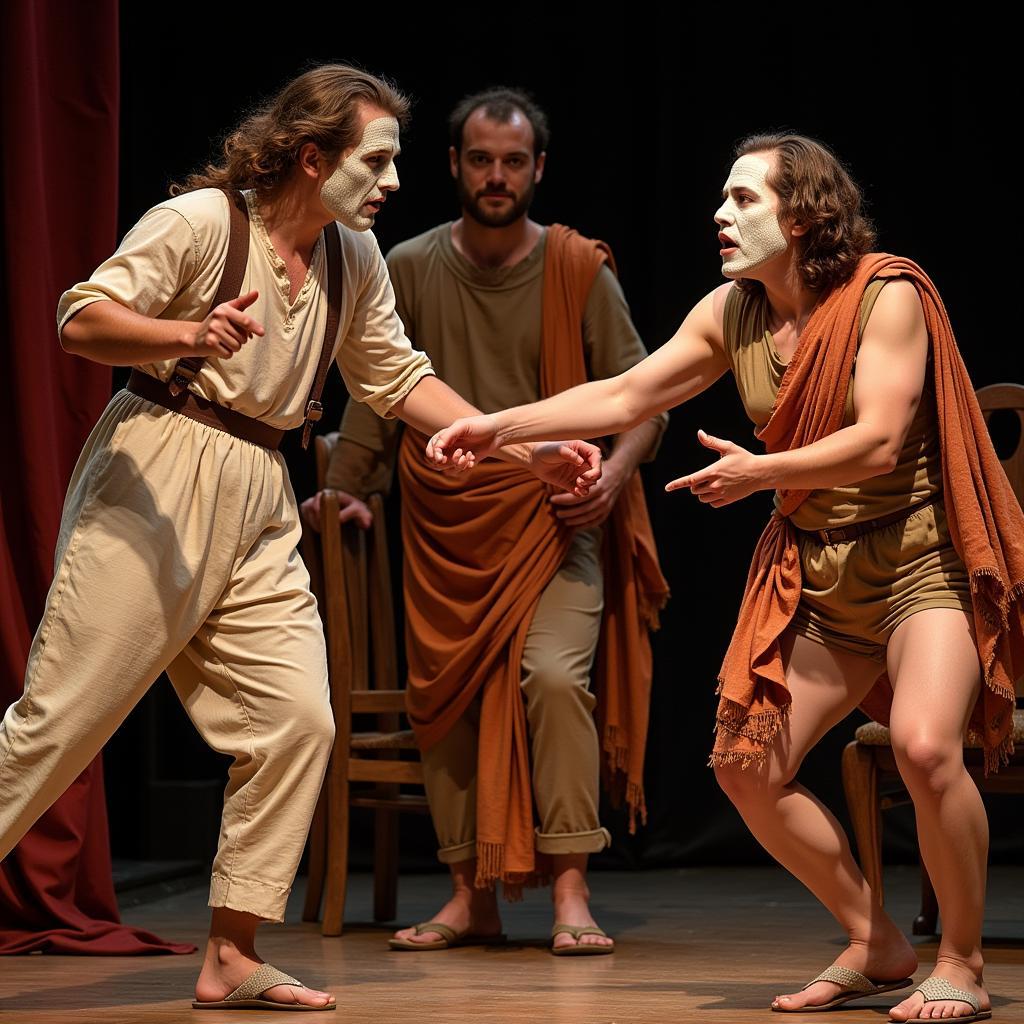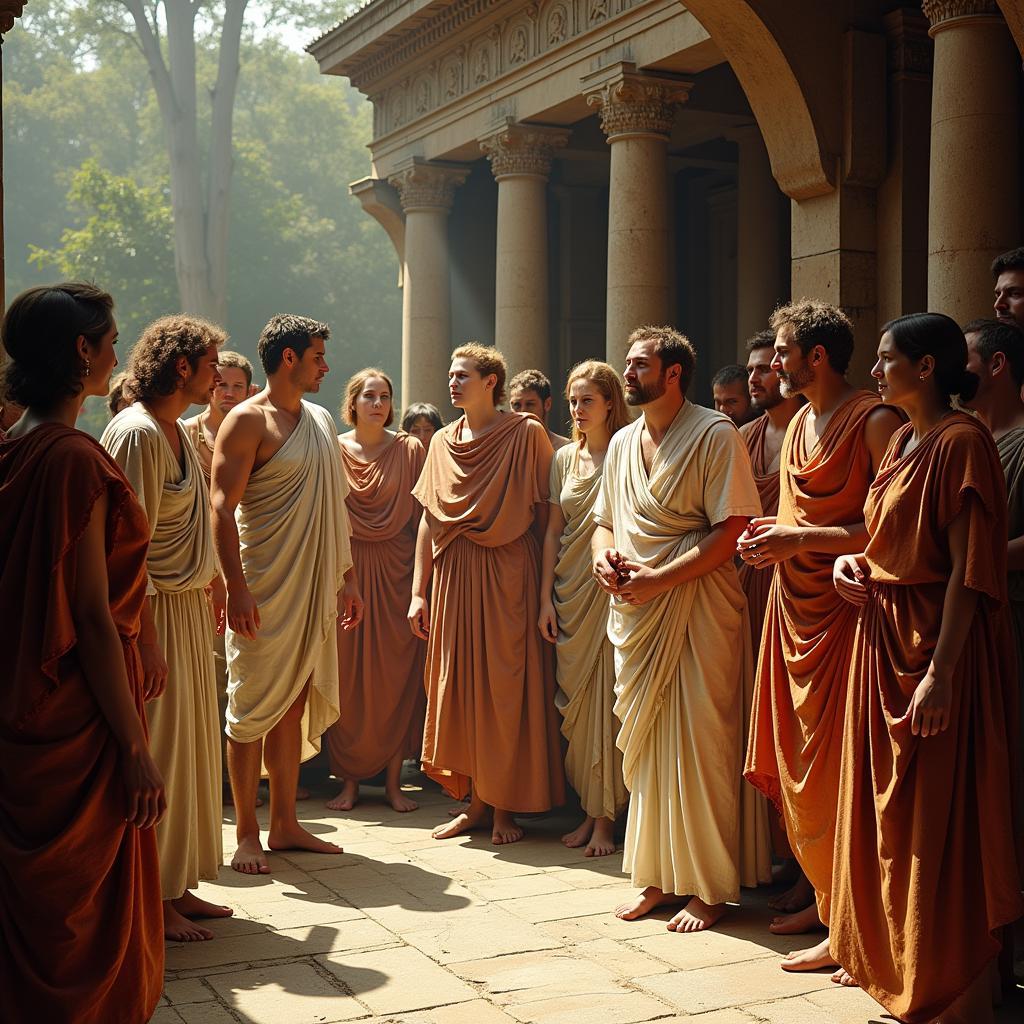Drama in ancient Greece wasn’t just entertainment; it was a powerful tool that profoundly shaped their society. From exploring religious beliefs to debating political ideologies, the stage served as a platform for influencing public opinion and reflecting the evolving values of the time. This article delves into the multifaceted ways drama impacted ancient Greek society.
The Religious Roots of Greek Drama and Societal Influence
Greek drama originated from religious rituals, primarily dedicated to Dionysus, the god of wine, fertility, and theatre. These early performances, often featuring choral hymns and dances, evolved into complex narratives exploring themes of fate, morality, and the human condition. The festivals dedicated to Dionysus became major social events, drawing people from all over the Greek world. This communal experience reinforced shared beliefs and strengthened social bonds. The plays, often depicting myths and legends, served as a means of transmitting religious and moral values to a wide audience.
Political Commentary and Social Discourse Through Drama
 Political satire in ancient Greek theatre
Political satire in ancient Greek theatre
As Greek drama matured, playwrights like Aeschylus, Sophocles, and Euripides began to incorporate political and social commentary into their works. Tragedies explored the consequences of hubris and the complexities of justice, often reflecting contemporary political dilemmas. Comedies, like those of Aristophanes, used satire and humor to critique politicians, social customs, and even philosophical ideas. This theatrical platform allowed for public debate and the expression of dissenting opinions, contributing to the development of democratic ideals and fostering a more engaged citizenry. Plays like Lysistrata by Aristophanes directly addressed the Peloponnesian War and advocated for peace, demonstrating the potential of drama to influence public opinion on crucial social and political issues.
How Did Tragedies Reflect Greek Society?
Tragedies often explored themes of fate, free will, and the nature of justice, mirroring the societal concerns of the time. They also served as a platform for exploring the complexities of human relationships and the consequences of individual choices.
How Did Comedies Shape Greek Society?
Comedies, through their satirical lens, offered a critical perspective on societal norms, political figures, and even philosophical ideas. They encouraged self-reflection and spurred public discussion on important issues, contributing to a more open and intellectually vibrant society.
The Hippocratic Society, like the playwrights of ancient Greece, understood the importance of ethics and societal well-being. You can learn more about their contributions on our hippocratic society page.
The Educational Role of Drama in Ancient Greece
 The educational impact of Greek theatre
The educational impact of Greek theatre
Beyond entertainment and political commentary, Greek drama played a significant educational role. Plays exposed audiences to mythology, history, and philosophical concepts, contributing to a shared cultural understanding. The chorus, a key element in Greek theatre, often served as a narrator, providing commentary on the action and offering moral guidance. This educational function of drama contributed to the development of a more informed and thoughtful citizenry, reinforcing societal values and promoting civic participation. The exploration of complex ethical dilemmas in plays like Antigone by Sophocles fostered discussions about individual conscience versus the laws of the state, contributing to a more nuanced understanding of civic responsibility.
Conclusion
Greek drama’s influence on society was pervasive, shaping religious beliefs, informing political discourse, and promoting education. From religious rituals to political satire, the stage became a powerful tool for influencing public opinion and reflecting the evolving values of ancient Greek society. Understanding how drama was used to influence Greek society offers valuable insights into the power of art to shape culture and human behavior.
FAQ
- What was the primary purpose of early Greek drama? (Religious rituals dedicated to Dionysus)
- Which playwrights incorporated political commentary into their works? (Aeschylus, Sophocles, Euripides, Aristophanes)
- How did comedies contribute to Greek society? (Satire, critique, public discussion)
- What was the educational role of Greek drama? (Exposure to mythology, history, philosophy)
- What key element in Greek theatre offered moral guidance? (The chorus)
- How did tragedies reflect Greek society? (Explored themes of fate, free will, justice)
- How did Lysistrata by Aristophanes influence Greek society? (Advocated for peace during the Peloponnesian War)
Common Scenarios
- Scenario: A student researching the impact of theatre on ancient Greek society.
- Scenario: A teacher preparing a lesson on the history and development of Greek drama.
- Scenario: An individual interested in exploring the connection between art and social influence.
Further Exploration
You might also be interested in learning about the hippocratic society and their contributions to medicine and ethics.
Need Support?
For assistance, please contact us: Phone: 02043854663, Email: societyforpeace@gmail.com, or visit our address: Khu 34, Bac Giang, 260000, Vietnam. Our customer service team is available 24/7.
 using WordPress and
using WordPress and